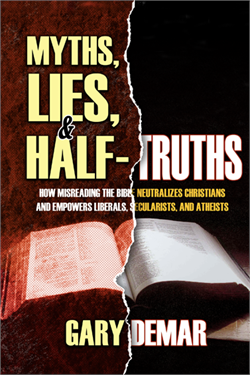Gary discusses the recent vote in Ohio and the typical diversionary tactics that went on with the wording of the referendum.
Laws against theft and murder are legislated, and they reflect some moral code. There are few people who would object to laws being made that would punish thieves and murderers. And yet, such laws impose a moral system on all of us. Although thieves and murderers might object, no one is calling for these laws to be rescinded because they “legislate morality.” Some critics of a religious basis for laws against murder and theft claim that “they or something like them are the basis of every other system of laws too. . . . The Ten Commandments, in this respect, are neither unique in themselves nor uniquely American.”[1] Should laws be respected and followed just because people generally agree that they should be laws? Why is a law a law? How does one account for a law’s ultimate validity? These are questions that secularists and materialists cannot answer without being inconsistent with their operating assumptions about the origin of the universe.
At one time there was a general moral consensus that abortion and homosexuality were morally wrong. Now the moral climate has shifted. Abortion has been legalized. What once constituted murder now is considered a cherished right that should be protected by law. With the moral universe now turned upside down, pro-abortion advocates believe it is immoral to deny a woman a right to an abortion. They work to impose laws on the whole society to protect the “moral rights” of those who want abortions. Constitutional scholar Archie Jones argues there is no way to escape legislating morality:
Every system of government exists to produce or enforce certain laws, and every law necessarily entails a set of moral assumptions. All morality—even that which is usually supposed to be, or touted as being, based upon an “irreligious” or “anti-religious” philosophical foundation—is ultimately religious in its nature, since it is founded upon a set of pretheoretical presuppositions, fundamental assumptions about the nature of reality, about God, man, and things, which are taken on (a usually unacknowledged) faith. In this deepest sense, then, the question for every legal system is not whether it will be based upon “religion” but rather which religion or religious philosophy will be its foundation?[2]
When one concept of what’s right or wrong is set against another in the debate over legislation, an appeal to morality is inevitably used. Everybody uses moral arguments to make a case for personal or legislative cause. “[L]eftists in many a Western country speak of a duty, a moral obligation on the part of the richer nations toward those less well off (just as richer individuals ought to aid poorer ones).”[3] So then, it’s not a question of whether morality will be legislated, but whose view of morality will be legislated?
Gary discusses the recent vote in Ohio and the typical diversionary tactics that went on with the wording of the referendum. Rather than clearly stating the intent of the proposed amendment (i.e., keeping abortion legal in the state), the ballot included many other “reproductive” buzzwords on it that muddied the issue.
Click here for today’s episode
Click here to browse all episodes of The Gary DeMar Podcast

Myths, Lies, and Half-Truths
Our nation is in a crisis. The world is crying out for answers in the face of bewildering and seemingly unsolvable problems. The rejection of any type of “this-worldly” application of the Bible has resulted in the proliferation of man-centered worldviews that have steadily drained the life out of our world and left behind a spiritual vacuum. Myths, Lies, and Half-Truths shows that the Bible has real answers to these problems—answers the church is currently ignoring.
- David Rensberger, “Commandments force-fed,” The Atlanta Journal-Constitution (October 3, 2003), A19.
- Archie P. Jones, “Christianity and the First Amendment: The Truth about the Religion Clauses of the Constitution,” (unpublished manuscript), 3.
- Erik von Kuehnelt-Leddihn, Leftism Revisited: From de Sade and Marx to Hitler and Pol Pot (Washington, D.C.: Regnery Gateway, 1990), 303.
















